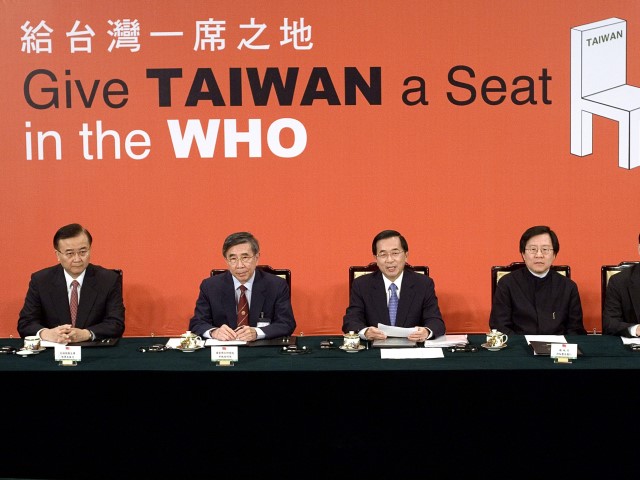The World Health Organization (W.H.O.) on Monday dismissed a proposal to include Taiwan in the ongoing annual World Health Assembly (WHA) meeting in Geneva, Switzerland.
Chinese state media celebrated W.H.O.’s decision, maintaining Beijing’s stance by excluding Taiwan as an observer for the eighth year in succession.
The state-operated Global Times on Monday praised the W.H.O. for its “unshakeable” allegiance to the “one-China principle” and accepting the inevitability of “reunification.” The “one-China principle” is Beijing’s unfounded claim that Taiwan’s government lacks legitimacy and that the island is a Chinese province.
United Nations General Assembly Resolution 2758, adopted in 1971, recognized the Communist government in Beijing as the “only legitimate government of China.” China often cites this resolution to exclude Taiwan from U.N. activities.
In this May 11, 2007, file photo, then Taiwan President Chen Shui-bian, center, answers questions from Geneva-based journalists during a video conference where he protested the World Health Organization’s rejection of the island’s latest bid for membership, at the Presidential Palace in Taipei, Taiwan. Taiwan has called repeatedly for it to be allowed to participate in the W.H.O., from which it has been barred by China. So strong is China’s diplomatic pressure that Taiwan can no longer take part in the organization’s annual World Health Assembly, even as an observer. (AP Photo, File)
The Global Times dismissed the inclusion efforts of Taiwan in the WHA as a malicious plot by “the U.S. and a few other Western countries” to erode the “one-China principle.”
“This is a very dangerous and destructive move, and is an attempt to cause more division and confrontation at the security, economic, and social levels in the international community, which will surely be opposed by all political forces and countries that love peace and prosperity,” the Communist newspaper asserted.
Taiwanese Health Minister Chiu Tai-yuan arrived in Geneva on Friday with a team of health experts and legislators, holding press conferences to highlight the injustice of Taiwan’s exclusion from the WHA meeting.
“We are calling for the international community’s support and urging the WHO to act in line with this year’s WHA theme — ‘All for Health, Health for All’ — by including Taiwan in the proceedings of the WHA as an observer, and allowing Taiwan’s regular participation in WHO meetings, activities and mechanisms,” Chiu stated on Monday.
Chiu contended that neither China’s often-cited UNGA Resolution 2758 nor W.H.O. policies prevent Taiwan from participating in the WHA as an observer.
“China has no right to interfere with or restrict Taiwan’s participation,” he declared, although China appears to have done precisely that for the eighth consecutive year.
The WHA’s exclusion of Taiwan represents another diplomatic setback for the Biden administration, which strongly advocated for W.H.O. to reinstate Taiwan’s observer status, a role Taiwan maintained from 2009 to 2016 with no significant issues.
The shift after 2016 came when Taiwan elected President Tsai Ing-wen, who was vehemently denounced by Beijing as a “separatist,” a sentiment also directed at her successor William Lai Ching-te. China initiated a campaign to diplomatically isolate Taiwan in all possible ways, including leveraging its influence at the W.H.O. to obstruct Taiwan’s observer status, defying medical ethics and scientific principles.
“Taiwan’s exceptional capabilities and approaches offer considerable value to inform the WHA’s deliberations. Time and again, Taiwan has demonstrated a capability and willingness to help address global health crises and support the global health community,” Secretary of State Antony Blinken asserted on May 1.
“Taiwan’s continued exclusion from this preeminent global health forum undermines inclusive global public health cooperation and security, which the world demands – and urgently needs,” Blinken argued.
